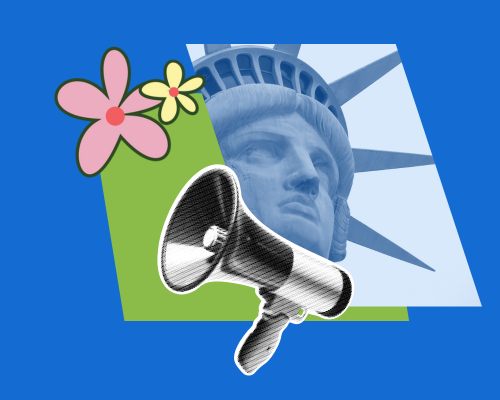
In the face of relentless threats to our civil rights and civil liberties, the ACLU of Washington has been working, together with community partners, and activists across the state to make Washington a firewall for freedom. We are more prepared than ever to meet today’s challenges.
At the ACLU of Washington, we rise to meet this moment with clarity, resilience, and unwavering hope. In these difficult times, remaining hopeful is a courageous and essential practice. We are deeply grateful to our supporters and community partners for working alongside us to build a Washington state that safeguards democracy and promotes the health and well-being of all.
Our work is driven by and grounded in the voices of those most directly impacted by injustice. We know that meaningful change must be shaped by the lived experience and leadership of communities who have been harmed by systemic oppression. It is our responsibility to uplift and center these voices to build collective power for a more just future.
We are proud to have helped advance significant wins this legislative session. The passage of critical updates to the Shield Law reaffirms Washington’s standing as a national leader in defending legal access to reproductive and gender-affirming care and protecting those who help people access care at a time when those rights are under coordinated national attack. Further, with your help and because of the strength of our coalition, the Legislature passed a budget that includes over $150 million for Apple Health Expansion, ensuring that thousands of immigrants that rely on these life-saving services will maintain their health care coverage. Immigrant communities are vital to our state, and we will keep fighting to ensure their right to access quality, affordable care is protected and expanded.
Other campaigns – from sentencing reform to the decriminalization of homelessness – did not culminate in new legislation this year, but built powerful momentum and strengthened our coalitions. Although the challenges we face are daunting, our coalition partners and legislative champions showed great courage in their persistence and commitment. Every campaign we pursued this session was guided by our core belief that dignity, safety, and opportunity should not depend on one’s race, income, immigration status, or zip code.
We are filled with gratitude for our allies, partners, supporters and activists who continue to show up and speak out. Together, we are working towards a Washington rooted in compassion, justice, and liberation. The work continues – and so does our hope.
Redefining Justice: Transforming Washington’s Sentencing Laws
Retroactive Sentencing Reforms for Juvenile Adjudications (HB 1274/SB 5715)
In the 2023 session, the ACLU-WA worked in close coalition with our allies – including formerly and currently incarcerated individuals, as well as tribes, and Indigenous organizations – to pass EHB 1324 and prospectively end the practice of punishing people twice for crimes they committed as children through the use of juvenile points in adult offender score calculations. This practice disproportionately harms communities of color and on average results in nearly an additional decade on a person’s underlying sentence.
This session, the ACLU-WA and our allies continued our fight to make this policy retroactive and provide relief for the 856 currently incarcerated people serving sentences they would no longer receive should they be sentenced today without their juvenile points. During the 2025 legislative session our coalition was able to amass an unprecedented level of support for this important policy change, including support from the Attorney General’s Office, Committees of the Superior Court Judges Association, the Minority & Justice Commission, the Sentencing Guidelines Commission, the Affiliated Tribes of Northwest Indians, and the Muckleshoot, Tulalip, Suquamish, Jamestown S’Klallam, Colville, Spokane, Yakama, Sauk-Suaittle, Skokomish, Hoh, Stillaguamish, Squaxin Island, Cowlitz, Chehalis, Snoqualmie, Lower Elwha Klallam, and Quinault Tribal nations. In addition, the bill was identified as a priority for the House Members of Color Caucus.
Although the bill did not pass this session, we remain committed to the fight to pass this important policy.
Offering a Second Look to Emerging Adults (HB 1317)
Second-look policies are a crucial tool to creating a fair and just legal system. These policies allow for an independent body of experts to reevaluate sentences, particularly for individuals who were sentenced as juveniles or young adults. This session, the ACLU-WA worked in coalition to advance the Emerging Adults bill that would build upon successful sentencing reform policy by expanding second look mechanisms through the Indeterminate Sentence Review Board (ISRB) for people given life or long sentences before their 21st birthday. This bill did not guarantee release but would have offered eligible incarcerated individuals the opportunity to go before the ISRB to have their sentences reconsidered in light of modern brain science, which recognizes the ongoing development of young minds and their capacity for change. This bill represented a meaningful step toward addressing racial disparities in sentencing, while reducing incarceration costs without impacting the court system.
The bill garnered a tremendous amount of public support and received two powerful public hearings in the House, but, unfortunately, did not advance to a floor vote. The ACLU-WA, alongside our allies and impacted community members, remains steadfast in advocating for sentencing reforms that align existing practices with constitutional law, science, and racial justice.
Reducing Police Violence
Traffic Safety for All (HB 1512/SB 5521)
Traffic deaths in Washington state are on the rise, yet police time and resources continue to be tied up in low-level traffic stops for maintenance issues – such as expired tabs or broken taillights – that do not threaten public safety. These types of stops disproportionately target Black drivers and other people of color, eroding trust between communities and law enforcement.
Worse still, what begins as a routine stop can quickly escalate. Across the country and here in Washington, people have been harassed, harmed, or even killed during encounters that never should have happened in the first place.
The Traffic Safety for All bill offered a smarter and safer alternative. It would have prioritized enforcement of the behaviors that genuinely endanger lives – such as drunk, distracted, or reckless driving – to make our roads safer while reducing racial disparities in traffic stops. Additionally, this bill would have created a community grant fund, a program to help low-income drivers in making necessary vehicle repairs, offering support rather than punishing people simply for being poor. Although this bill did not pass out of committee in the House, the ACLU-WA, together with our partners in the Traffic Safety for All Coalition, successfully advocated for the renewal of this program in the state budget, allocating $750,000 to fund vehicle repair grants — bringing meaningful support to those who need it most. We remain committed to reducing police violence, eliminating racial disparities, and making Washington’s roads safer for everyone.
Decriminalizing Homelessness
Safe Spaces, Strong Communities (HB 1380)
Like many states across the country, Washington is facing a housing crisis which is the result of decades of policy failure, systemic disinvestment, and fueled by a severe shortage of affordable housing and shelter space. As a result, thousands of Washingtonians are left with no choice but to sleep outside — in tents, vehicles, or public spaces — because there simply aren’t enough safe, accessible housing options available.
Too often, the responsibility of responding to this crisis falls on local governments, many of which lack the resources, shelter beds, and support systems needed to meet the needs of unhoused residents or to address the root causes of homelessness.
In the absence of real solutions, many cities have turned to punitive laws like anti-camping and sit-and-lie ordinances that effectively criminalize the mere act of surviving in public, trapping people in cycles of incarceration and homelessness, and making it exceedingly difficult or impossible to access housing, employment, or medical care. This is both deeply harmful to vulnerable communities and exorbitantly expensive for cities.
The Safe Spaces, Strong Communities Act offered a better path forward. This bill would have established statewide guardrails on when and how local governments can enact objectively reasonable regulations that protect public spaces while recognizing the humanity and dignity of unhoused residents. It aimed to shift resources away from criminalization and toward what actually works: permanent housing, supportive services, and community-based care.
While HB 1380 did not reach the House floor this session, the momentum behind it was significant. As a first-year bill, it advanced further than expected and sparked critical conversations among lawmakers, local leaders, and community members. We are proud to work alongside a powerful coalition of advocates, service providers, and directly impacted people in championing this vision.
Our work continues. We remain steadfast in our commitment to ending the criminalization of homelessness and building communities where everyone — regardless of housing status — has safety, dignity, and a place to call home.
Protecting Access to Essential Health Care
Apple Health Expansion for Immigrants
In 2023, the ACLU-WA, as a core member of the Health Equity for Immigrants Coalition, successfully advocated for the creation of the Apple Health Expansion program: a Medicaid-like program for immigrant communities. Today, this program is providing healthcare coverage to 12,000 immigrants across Washington. However, more than 16,000 eligible individuals are still on the waitlist. Ensuring the program is fully funded, accessible, and accountable to the communities remains a top priority.
This session, in strong collaboration with coalition partners, we advocated for the Legislature to, at a minimum, maintain existing funding levels for the Apple Health Expansion program, ensuring that all 12,000 immigrants currently enrolled would retain their life-saving health care coverage. Amidst significant budget deficit challenges and with your help, we won! For a third year in a row, the Legislature made a sizeable investment in this program. This year’s biennial budget includes $153 million to continue providing access to high-quality, affordable care. We will continue advocating for additional funding to expand the program to meet the community’s needs. As the federal government continues its attacks on immigrants and works to gut social safety nets, Washington state has boldly chosen a different path. The ACLU-WA remains committed to working alongside our coalition partners to secure long-term funding so that every member of our community, regardless of immigration status, has access to comprehensive, affordable, and life-saving health care.
Strengthening Washington’s Shield Law (SB 5632)
Washington remains strong as a leader in protecting reproductive rights, but in the wake of the rollback of federal protections, our state must be vigilant. Across the country, states such as Idaho and Texas have attempted to prosecute individuals for seeking reproductive or gender-affirming health care outside their borders. In 2023, the ACLU-WA worked alongside a broad coalition of reproductive rights advocates to pass ESHB 1469, the Shield Law, to ensure that everyone within Washington’s borders can access essential care without fear of legal repercussions from out of state.
This session, the ACLU-WA advocated for SB 5632, a bill that makes important updates to the Shield Law. The bill makes it crystal clear that the Shield Law’s protections extend not only to people receiving protected health care services, but also to those providing financial, logistical, informational, or travel-related support. It also ensures that the Washington state Attorney General’s Office is notified whenever a Washington-based business receives a subpoena or court order that may violate the Shield Law’s protections around private health care data.
We were proud to stand with our allies to strengthen Washington’s Shield Law this session and we will remain vigilant of additional opportunities to ensure this law is effective. These protections are more critical than ever, and the ACLU-WA remains committed to defending access to reproductive and gender-affirming care.
Countering Technological Threats
Protecting Against Extensive Surveillance
The use of surveillance systems is increasing exponentially and is embedded into everyday infrastructure and daily life. In today’s world – where microphones and cameras are all around us, these technologies enable an unprecedented level of monitoring and control. Advances in technology are dramatically expanding the scope and scale of this surveillance infrastructure and the degree to which people can be surveilled and tracked, making this fight more important than ever.
This session, the ACLU-WA opposed HB 1423, a bill that would have increased surveillance technology in Washington by authorizing the use of automated vehicle noise enforcement cameras. These devices would have added yet another layer of surveillance to our public spaces and neighborhoods by using cameras and microphones to capture people’s movements and potentially even their conversations without consent. The devices would be capable of amassing a treasure trove of sensitive data that could be exploited or misused, putting vulnerable people at risk, including people seeking reproductive or gender-affirming healthcare, immigrants, and other marginalized groups. We are encouraged that this bill ultimately did not move forward, and we will continue to work with our allies to resist the spread of surveillance technologies.
Protecting Personal Privacy
The ACLU-WA has long fought to protect the fundamental right to privacy. This session, we voiced concerns about the privacy and civil rights implications of SB 5708, a bill that focused on reducing youth exposure to internet-based “addictive feeds.” While addressing young people’s mental health is an admirable goal, this bill was a blunt instrument that would have had drastic implications for people’s privacy and civil liberties. The bill would have required providers of ‘addictive feeds’ that are likely to be accessed by minors, such as social media companies, to estimate all their users’ ages to identify minors. To estimate users’ ages with “reasonable certainty,” platforms would likely have to conduct age verification beyond relying on the data they may already have on users, such as through requiring users to provide government-issued IDs for access. This would have increased the amount of sensitive data platforms collect and retain about people and would also chill access to platforms for adult users in a potential restriction on constitutionally protected speech. Working in coordination with other concerned organizations, we are grateful that the Legislature took our civil liberties and rights concerns seriously and chose not to move forward with this legislation.
The Road Ahead
After the close of the 2025 legislative session, we are reflecting with gratitude on the powerful coalitions we’ve built, the progress we’ve made together, and the commitment and courage of impacted communities who continue to lead the way. We find hope, even in the face of political backlash, that something better is possible even when the path is long and arduous. Lasting change rarely happens all at once, nor does it happen linearly. It is the result of a persistent, collective struggle. As we look ahead to the next session, the ACLU of Washington remains grounded in our commitment to building a thriving, inclusive democracy alongside our allies, activists, and community partners. Thank you for joining us in this important work.




